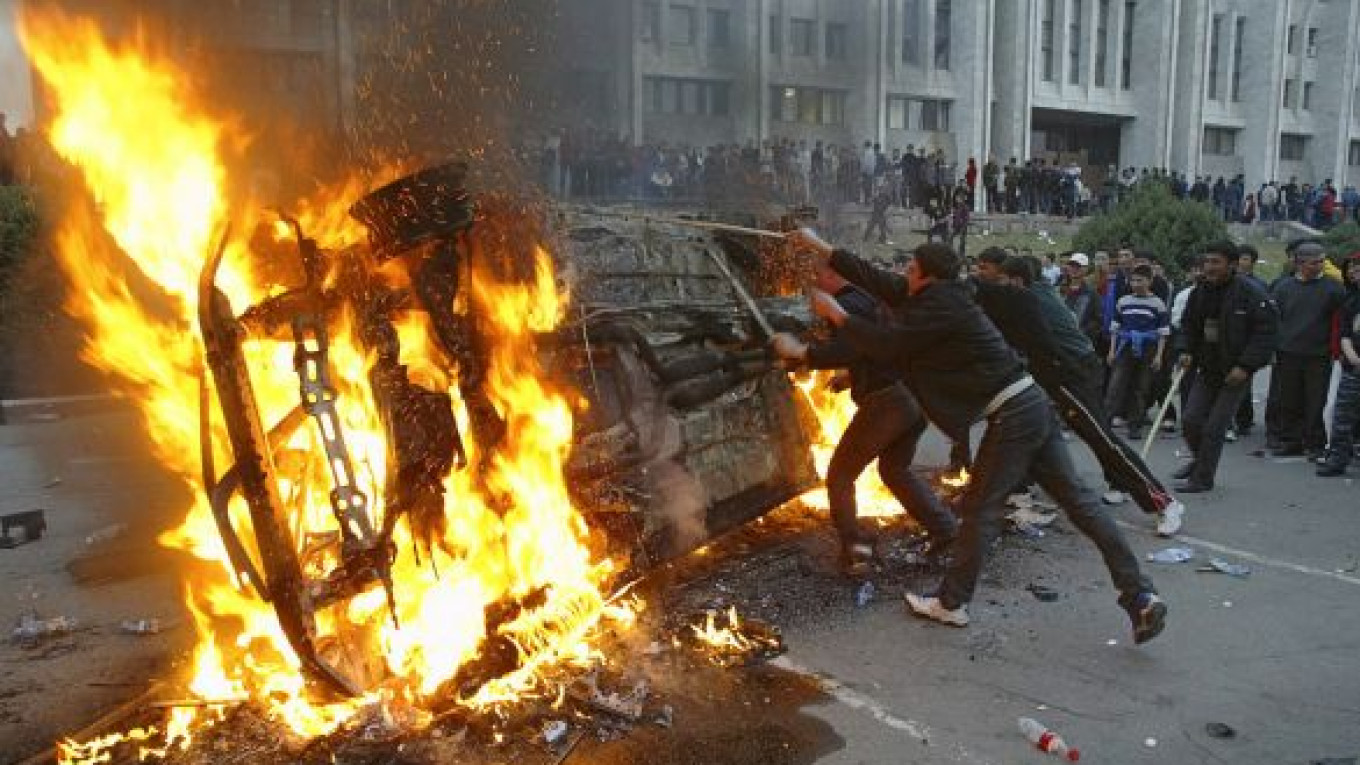BISHKEK, Kyrgyzstan — On the anniversary of the uprising that toppled Kyrgyzstan's's hardline leader, the same revolutionaries who came to power promising a new era of freedom announced they have given up on Western-style democracy.
Five years ago this week, about 1,000 angry protesters laid waste to Kyrgyzstan's presidential compound, ousting President Askar Akayev and bringing hopes of a fresh start.
But as in Ukraine and Georgia, where peaceful revolutions raised similar hopes, dreams of sweeping change have soured. Many worry that this struggling Central Asian nation is rapidly plummeting into full-blown authoritarianism.
"The world is actively discussing the shortcomings of a model of democracy based on elections and human rights," Kyrgyz President Kurmanbek Bakiyev told a national assembly Tuesday. "There is no certainty that such a model is suitable for all countries and peoples."
Kyrgyzstan lacks the copious oil and gas reserves of its neighbors, but its strategic location has made it the object of lively interest from Russia and the United States, which both maintain bases here.
Attention from these eager suitors has done little, however, to improve the country's economic health, and many people are gloomy about Kyrgyzstan's future.
"All the talented and educated people are leaving the country," said Aisha Maratova, a 39-year-old music teacher in the capital, Bishkek. "Kyrgyzstan was once respected as a democratic state — now it has an international image of a corrupt and backward country."
Bakiyev — the opposition leader who spearheaded the Tulip Revolution of March 24, 2005 — was hailed as a reformer when he was appointed caretaker president that day following the sacking of Akayev's office.
Emerging from the parliament, Bakiyev told a cheering crowd assembled in a central square of the capital that "freedom has finally come to us."
Since then, Bakiyev has tightened his grip on power at the expense of the very liberties he promised.
In recent years, government opponents have faced physical intimidation, threats and legal prosecution. Last summer, Bakiyev was elected to a second term as president in an election described as fraudulent by international election observers.
Independent reporters and political analysts critical of the government have been subjected to vicious beatings. And in recent weeks, the U.S. government-funded Radio Free Europe/Radio Liberty's Kyrgyz radio service has been taken off the air, while prominent Central Asia-focused web sites have been made inaccessible.
Kyrgyz authorities deny they are trying to silence dissent, but experts are skeptical.
"The Tulip Revolution marked a negative turning point in the democratic development of Central Asia," said Alexander Cooley, a political scientist at Columbia University.
Some hoped Kyrgyzstan's revolt would help bring democracy and the rule of law to other former Soviet countries, but the opposite may have been the case.
"In countries such as Kazakhstan, Uzbekistan, Belarus and Azerbaijan, alarmed governments equated democratization with regime change and clamped down on the activities of domestic civil society, externally sponsored non-governmental organizations and their media," Cooley said.
Initially, the Tulip Revolution stoked expectations that the country might move Westward. Those hopes evaporated last year, when Bakiyev ordered the United States to vacate the Manas air base on the same day that Russia pledged billions of dollars in aid and loans.
Moscow appeared victorious in its apparent effort to squeeze the United States out of a region it views as its own fiefdom. But within months, the Kyrgyz again turned the tables, agreeing to allow the Americans to stay in exchange for higher rent for Manas.
All the diplomatic double game seems to have achieved is to anger Kyrgyzstan's most steadfast allies.
"Relations with Russia have never been as bad as under the Bakiyev regime," said Bishkek-based analyst Alexander Knyazev.


